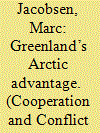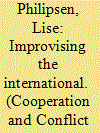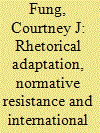|
|
|
Sort Order |
|
|
|
Items / Page
|
|
|
|
|
|
|
| Srl | Item |
| 1 |
ID:
173743


|
|
|
|
|
| Summary/Abstract |
This article argues that on balance globalization does not increase, and may even reduce, the opportunity cost of Militarized Interstate Disputes (MIDs), as measured by foregone merchandise trade. Specifically, globalization makes it easier for states to substitute trade partners, makes it difficult to employ trade sanctions, makes credit more available to states at conflict, and encourages trade-substituting horizontal Foreign Direct Investment (FDI) and sanctions-resilient vertical FDI. Hypotheses are supported using High Dimensional Fixed Effects regression, applied to a Gravity model, with two-way clustering of standard errors, and an analysis of the effect of globalization on the marginal effect of MIDs on international trade. This suggests that while wars are becoming infrequent in recent decades, due to other factors, trade’s contribution to peace is diminishing.
|
|
|
|
|
|
|
|
|
|
|
|
|
|
|
|
| 2 |
ID:
173740


|
|
|
|
|
| Summary/Abstract |
Greenland representatives successfully use the renewed international geostrategic interest in the Arctic to enhance Greenland’s foreign policy sovereignty. This is facilitated by Denmark’s dependence on Greenland’s geographic location and continuous membership of the Danish Realm for maintaining the status of an Arctic state, which recently has become one of the five most important security and foreign policy priorities. The dependency gives Greenland an ‘Arctic advantage’ in negotiations with Denmark, while turning circumpolar events into strategic arenas for sovereignty games in the aim to move the boundary of what Greenland may do internationally without Danish involvement. This article analyzes how these games unfold in the Arctic Council, at the high-level Ilulissat meetings and at circumpolar conferences where Greenland representatives articulate, act and appear more foreign policy sovereignty through outspoken discontent, tacit gestures and symbolic alterations. Altogether, this contributes to the expanding of Greenland’s foreign policy room for maneuver within the current legal frameworks, while enhancing Greenland’s international status and attracting external investments, important in their striving towards becoming a state with full formal Westphalian sovereignty.
|
|
|
|
|
|
|
|
|
|
|
|
|
|
|
|
| 3 |
ID:
173742


|
|
|
|
|
| Summary/Abstract |
Internationally sponsored interventions in fragile and conflict-affected states are often resisted by domestic actors who have deep local knowledge, profoundly different expectations of political processes, and keen desires to shape their country’s future. Many forms of local resistance can damage or stall the progress of externally driven peacebuilding, but the critical peacebuilding literature has suffered from an inability to articulate coherent strategic alternatives to the dominant paradigm of liberal interventionism. This paradigm, we argue, is actually part of what fuels continued resistance: as external actors seek to implant liberal democratic norms into local bureaucratic and political cultures, countless sites of conflict emerge, with local and international actors jockeying between and amongst each other for position, resources, and control over the specificities of reform. These struggles – effectively a competition over local ownership – are at the centre of peacebuilding and will determine short- and long-term intervention outcomes. Focusing on the case of political reform in Afghanistan, this article develops a grounded theory of ownership as ‘meta-conflict’, in which participant voices from local and international peacebuilding leaders, working in-country, are given a primary role in determining the compatibility of the donor community’s prevailing liberal agenda with local requirements for building peace.
|
|
|
|
|
|
|
|
|
|
|
|
|
|
|
|
| 4 |
ID:
173739


|
|
|
|
|
| Summary/Abstract |
In this article, I argue that the introduction of ethnography to International Relations has not taken full advantage of the potential of bringing these two fields together. Using international intervention as an example, I suggest that to bring out this potential we need to be more attentive to the classical virtues of ethnography. This means taking the subjects of our studies much more seriously, as people capable of making sense of and reacting to the structures of power they are embedded in. Here implementers tasked to put international policies into action in relation to a concrete context provide an overlooked source of knowledge. Using their experiences, reflections and ways of dealing with the concrete dilemmas that arise in their daily work enables us to analyse intervention as concrete relations of power that play out, affect and are mitigated by people in the field. Seeing knowledge as in this manner arising from the field provides a deeper knowledge that is necessary if we want to read intervention not only as an exertion of power from the international to the local, but as dynamically reshaped, resisted and made sense of in the field.
|
|
|
|
|
|
|
|
|
|
|
|
|
|
|
|
| 5 |
ID:
173741


|
|
|
|
|
| Summary/Abstract |
How do rising powers execute normative resistance to shape international order? Contrary to the existing literature, I argue that rising powers are productive agents of normative change and international order-making, through the use of rhetorical adaptation to contest pre-existing orders. Rhetorical adaptation is a strategy and set of tactics that simultaneously modifies norm content, while reducing critiques of obstructionism. To make this argument, this article traces China’s efforts as a ‘norm shaper’ regarding the responsibility to protect through the inception, institutionalization and implementation of the norm in the landmark 2011 Libya intervention. China layers traditional sovereignty norms under the responsibility to protect, focusing and narrowing the emerging norm by fortifying the primacy of the state. While I show how China resists co-option into an evolving ontological order that challenges traditional sovereignty, the article also addresses the unforeseen consequences of China’s normative efforts that ‘backfired’ to permit the use of the responsibility to protect to justify Libyan regime change. More broadly, this article speaks to rising powers as agents crafting international order, and the process of normative resistance that occurs throughout the norm life cycle. I draw from publicly available documents and semi-structured interviews with Chinese foreign policy and United Nations elites.
|
|
|
|
|
|
|
|
|
|
|
|
|
|
|
|
| 6 |
ID:
173744


|
|
|
|
|
| Summary/Abstract |
The EU has been a key actor in shaping European gender regimes in post-war Europe. There is a substantial amount of work on the role of the EU as a gender actor, particularly in employment and social policy. The adoption of and consistent referral to equality as a fundamental value of the EU raises important questions about the way the EU promotes ‘soft’ values in an international setting, through its security and defence policy, particularly as the EU is trying to promote itself as a normative actor. Hence, this article sets out to analyse where gender equality, as a policy frame, is located within the European External Action Service (EEAS). Through an investigation into whether the core normative principles of gender equality and mainstreaming have permeated this policy domain, we then focus on how the EEAS reflects the EU’s gender regime, which is informed by Walby’s framework, and how this shapes mainstream security and defence policies. We find that the neo-liberal foundations of the EU permeate the way the EEAS incorporates the principle of equality, leading to a shallow understanding that focuses on adding women into existing structures.
|
|
|
|
|
|
|
|
|
|
|
|
|
|
|
|
|
|
|
|
|